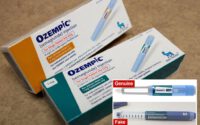Startling number of women using TikTok to self-diagnose ADHD
Women are diagnosing themselves with neurodivergent conditions such as ADHD (attention-deficit/hyperactivity disorder) after watching trending TikTok videos.
Doctors explained to Women’s Health that women are statistically more likely to have symptoms overlooked and go undiagnosed, but they warned licensed professionals should be giving the diagnosis — not armchair “experts” on social media.
TikTok videos touting the different ADHD symptoms have been surging in popularity in recent years as some corners of social media have become a safe haven for addressing mental health, and spreading information and awareness.
A variety of viral hashtags have an astonishing number of views on the platform. Some of the most popular beyond #ADHD, which has 14 billion, include #ADHDTikTok with 4 billion views, #ADHDCheck with 1.2 billion watches, #ADHDTok with 619 million hits, #ADHDdiagnosis racking up 46.1 million and #ADHDadvice with 8.9 million.
#ADHDinWomen is another highly followed hashtag, with 1.7 billion views — a startling number given that multiple studies have found that girls, women and gender-nonconforming people are commonly undiagnosed, with their symptoms brushed off as character traits or displayed differently than in boys or men, since most medical studies are conducted primarily on men.
Claire Bowman describes herself as an ADHD advocate to her 160,300 TikTok followers. One of her videos listing questions to help diagnose ADHD in women went viral with 204,900 views and hundreds of women sharing their emotional responses.
“Ugh I started crying by the end,” one viewer said.
“Recently diagnosed at 25, spent my entire life thinking I was a lazy pathetic POS [piece of s–t] who just wanted to get everything for nothing. My life has changed,” another user shared.
“Thanks for explaining my whole life,” another commented.
Many neurodivergent conditions are diagnosed at a very young age, the CDC points out, but some women told Women’s Health they feel validated for their “quirks” or “laziness” after being given a proper diagnosis in adulthood.
Caitlin Manner, 38, was one such person who believed she had the disorder, especially since her TikTok feed became flooded with #ADHD videos during the pandemic.
As she related to what she saw on social media, she also pointed to how she always struggled with keeping things in order, remembering appointments and completing tasks. However, the mother-of-three chalked it up to being a busy mother in a military family.
Manner told the magazine she always wondered if her symptoms had been overlooked throughout her life, especially since she was surrounded by people with neurodivergent conditions — differing in mental or neurological function from what is considered typical — her whole life; Her mom, dad, twin sister, younger brother, and one of her three sons have all been diagnosed with ADHD and her oldest and youngest sons are on the autism spectrum.
But things boiled over when Manner missed a crucial appointment for her eldest child to continue speech therapy and couldn’t reschedule for three months.
“It was really frustrating because I knew how important it was and still couldn’t keep track of it,” Manner told Women’s Health.
So, she set up an appointment with a licensed clinical psychologist in April 2021 to discuss her family history and symptoms and was ultimately diagnosed with ADHD.
“It gave me a name for it, which meant I could start reframing my life,” she said.
While social media is a great tool to spread information, experts have been weary about people turning to the internet for medical advice as they warn that symptoms can vary from person to person and can indicate different or concurrent diagnoses for an array of conditions.
“It’s important to not get too entrenched in a diagnosis without speaking or corroborating with a mental health professional because it takes a trained brain to synthesize all of those data points in conjunction with your medical, psychological, and psychiatric presentations in order to arrive at the correct diagnosis,” Dr. Sasha Hamdani, a board-certified psychiatrist on TikTok as @ThePsychDoctorMD told Women’s Health.
Experts have also warned that startups are using slick TikTok ads and loosened drug regulations to push prescription medications for ADHD like Adderall and Vyvanse — both classified as Schedule II controlled substances by the FDA — raising ethical and legal questions from doctors.
Combined with social media posts and sketchy Google search results, the proliferation of drug ads on TikTok can convince children to diagnose themselves with conditions they may not actually have, according to University of Colorado psychiatrist Dr. C. Neill Epperson.
“I hear parents say, you know, my kid comes to me and says, ‘I think I have ADHD, PTSD, bipolar disorder, etc.,’” Epperson told The Post. “They’re like, ‘Where is my kid getting this? Where are these diagnoses coming from when I haven’t taken my child to a mental healthcare provider? We haven’t even spoken to their pediatrician.’”
Sammi Burke, a 28-year-old EMT, writer and editor, told Women’s Health she began to think that she had ADHD after her TikTok feed continued to recommend #ADHD videos for her. She set an appointment with a psychiatrist and was prescribed medication noting that she displayed some symptoms, but wasn’t a “textbook” case.
As the bills piled up without her condition improving, she decided to drop the medication when she realized that her environment — loud neighbors, a heavy workload and spending hours on end staring at a screen — might have played a major role in her lack of focus.
“I still don’t know if I for sure have ADHD,” she said. “I wasn’t so much looking for a label as a way to get through my workday.”


